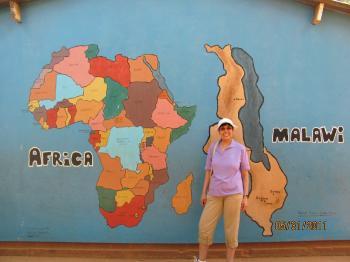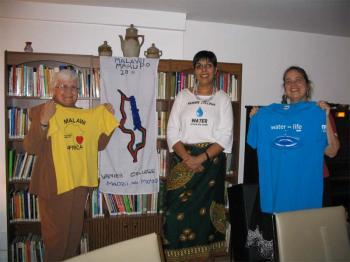
Montreal to Makupo…
On September 30, 2011 about 25 English Associates, Sisters and guests gathered at Marylrose convent for a presentation on Malawi and the environment. It was offered by Jeannie Albert SNJM Associate, who had travelled to Malawi, Africa in June 2011, as a supervisor of eight Vanier College students.
Their task was to look at the issues pertaining to access to clean water in Malawi. For example, one pair of students looked at water issues and how it impacts on people’s health, other students researched environment, gender, culture, politics and the economics of water access.
The end goal was to be able to come home to Canada and sensitize people here about the water crisis affecting our planet. Jeannie’s power point presentation contained many pictures of the daily life, beauty and hardship of Malawi.

Her group stayed in the rural village of Makupo and experienced firsthand what it is like to live without running water and electricity. The challenges were many, but the learning was invaluable for the students.
With the help of guides/translators, hired from the village, students interviewed local villagers, chiefs, workers at the Red Cross, Ministry of Water and Irrigation and even an official from the World Bank, just to mention a few.
One of the top five issues facing Malawi right now is deforestation. This is a consequence of a growing demand for land as the population increases. Eighty per cent of Malawians live in rural areas but only fifty seven percent of them have access to clean water.
Many women and young girls spend their early mornings walking miles to the nearest well, and then carrying their buckets of precious water on their heads back to their villages. This is their daily supply of water.

In contrast, Canadians each use 329 litres of water a day. We have the cheapest tap water in the First World at $.31 per cubic meter. Many of us are silly enough to buy bottled water at about $1.50 a litre. Our once abundant natural resource is quickly disappearing and we only have to think about our lakes in the Laurentians to know this is true.
Many of them are contaminated with e.coli bacteria from human waste or blue green algae from our use of phosphate- laden detergents. Lakes and rivers across North America are drying up, no longer the renewable resource we have taken for granted.
Inuit hunters had to stop their hunt early this year because the polar ice cap is melting faster and has become more fragile and dangerous to venture out on. The elders in the community can no longer predict the Arctic weather the way they have for hundreds of years. They have to rely on the young guys with computer access to Environment Canada!
Every effort counts, no matter how small. While it may seem strange at first glance to talk about environmental issues in Africa and in Canada in the same presentation, a longer look reveals again that we are all connected and the harm we do to the environment in one part of the world, has global effects.
Jeannie’s presentation ended with a slide of the map of Canada and a question to the group:
“What are you doing to save our water and environment?”